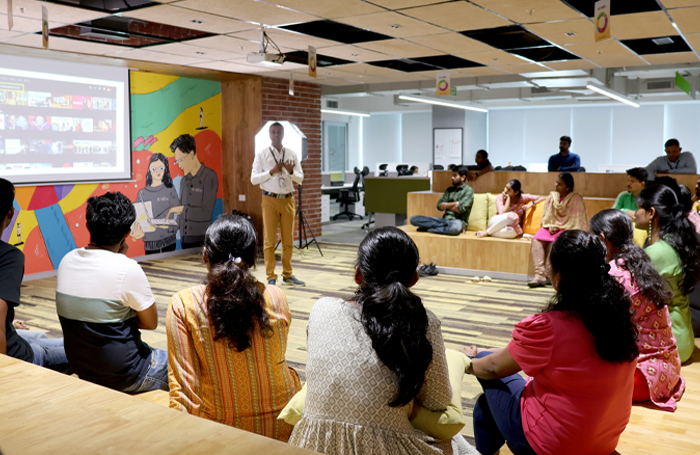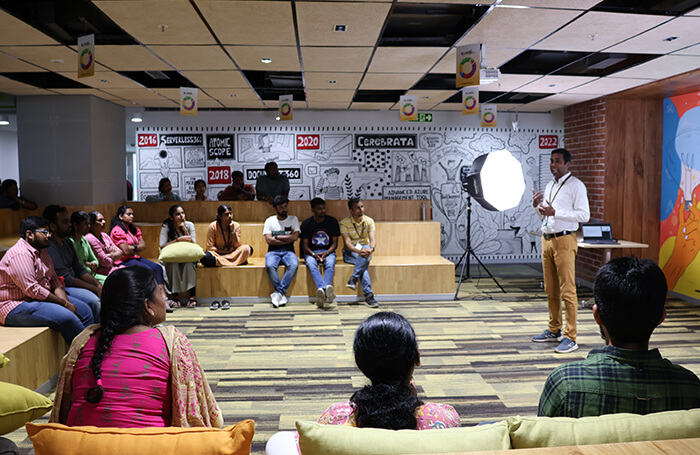Introduction
How often do you walk into a mall with your Bluetooth switched on? Or casually log into every free Wi-Fi spot we find, either because we are traveling or to save our mobile data. Well, probably often due to habit, necessity, convenience, or ignorance. As the lines between our online and offline lives blur, it is good to know the impact of the above actions
With Data Privacy Day falling on January 28, we at Kovai.co conducted an awareness session on how our personal data is collected and used. Selvaraaju, Head of Data Science also spoke on the importance of digital privacy and how to keep your personal data safe.

What is Data?
Selva began the session with a simple question asking people to define the term “data”. While numbers, information, and details were some of the guesses from the audience, the accepted definition of data is a “representation of agreed facts”. “Data is anything that’s factual and agreed on by stakeholders, like the number of leads we generated from a campaign, the number of clicks a blog received, etc,” he explained.
According to a Statista report, the quantum of data being collected across the globe is growing. The figure, which stood at two zettabytes in 2010, has grown to 97 zettabytes in 2022 and is expected to grow further to 181 zettabytes by 2025.
How is your Personal Data harvested?
Selva explained that the primary source of personal data collection is through B2C apps, which collect many data when you sign up. This includes Uber, Swiggy, Zomato, Paytm, Netflix, WhatsApp, Instagram, Facebook, etc.
“They derive data like our age, gender, hobbles, professional network, our relationship status, food preference, partner preference, movies and music we like, our salary, spending patterns, ideology, and even spiritual beliefs,” he says. “And every letter we key into a platform has a time stamp on it mentioning the time, location, and activity, becomes a digital footprint that can never be erased,” he adds.
Selva says, we blindly agree to apps’ terms and conditions to use the app. The apps collect our data, behavioral data, and location data and stream them to big corporations that use them to target us personally. Our data has become a battleground for companies so that they can get more and more of our data,” he says.
What is our data used for?
There are growing news reports that most big corporations have begun using AI (artificial intelligence), which learns from our patterns and trends and makes predictions based on that. “It gives us a new list of recommendations every time we log into YouTube or Netflix and gives our brain, what is called digital nudges,” he explains. “It recommends a bundle purchase on amazon even if we are looking to buy a single product,”.

Giving us a few examples, he says when we switch on our Bluetooth when we are inside a mall, brands get the information through Bluetooth beacons and incidentally send us the best offer a brand inside the mall has. This would prompt us to visit the store even if we didn’t plan earlier. If we upload a picture of us with our partner on Instagram, it detects that we are in a romantic mood and sends us suggestions of things we enjoy doing as a couple like travel offers, and restaurants with date night locations among others. “We as humans can be manipulated,” he says.
How can we protect ourselves from digital manipulation?
While there are guidelines like GDPR (General Data Protection Regulation) in Europe and CCPA (California Consumer Protection Act), Selva says that if we don’t want to be manipulated, we have to limit sharing of our personal data. “A few small steps can be switching off your mobile phone’s Bluetooth and mobile network when not in use, not logging into free Wi-Fi platforms unless necessary, not sharing your passport images on WhatsApp, share maybe your year of birth and not the exact date,” he says.
Conclusion
The session with a short quiz on Slido which assessed our understanding of concepts, and practices and revised with us ways we can protect ourselves from being leveraged with data. People can watch “Social Hack” on Netflix to again get a glimpse into how our personal data is collected and used on us.

